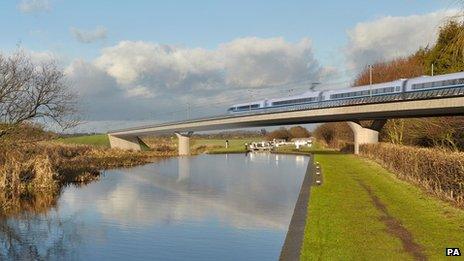What KPMG ignored when arguing for HS2
- Published
- comments

Today's report by KPMG on the alleged economic benefits of love-it or hate-it HS2 is based on a plausible assumption - that there are substantial economic benefits when businesses in a region have improved access to suppliers, customers and potential employees, and when consumers have a greater choice of potential suppliers of goods and services.
If a company can buy parts or services from a greater number of suppliers, the buyer ought to be able to obtain better quality stuff cheaper. The same argument applies when consumers have an improved ability to shop around - we get more bang for our pounds.
Also access to a wider, more diverse pool of labour has an equivalent benefit for businesses. They in theory are able to recruit better skilled, more productive people, for reasonable salaries.
These reductions in the price of goods, services and labour, coupled with improvements in the quality of goods, services and labour, should in theory have a dynamic self-reinforcing effect on output, on the GDP of the relevant region.
KPMG's report, commissioned by HS2 (just so that you know where it is coming from), then argues that HS2 will significantly improve the connectedness of businesses and people (labour) in many regions.
So, for example, it asserts that there will be a 15.7% improvement in "labour connectivity by rail" (horrible phrase) of the West Midlands, and a 21.1% improvement in "business connectivity by rail" there.
This in turn would translate, it says, into a productivity gain in the West Midlands of up to £3.1bn (in today's prices) and a 4.2% boost to annual economic output or GDP in the region by 2037.
KPMG calculates that the GDP gains would be a little bit bigger in the Derby/Nottingham area, a maximum 4.3% increment to GDP, but considerably smaller in Greater Manchester - where there would be an increase in GDP between 0.8% and 1.7%.
This differential gain between Derby/Nottingham and Manchester seems to stem from the differential impact on connectedness - according to KPMG, HS2 hardly improves labour connectivity by rail at all in Manchester.
At this point I need to point out that connectivity in KPMG's terms does not mean the ability to whizz to London from Manchester or Birmingham on a superfast train, although it partly means that.
The speed of HS2 seems barely relevant at all.
It is talking about a wider improvement in the capacity of the rail network to transport people and goods that will flow from the increased capacity provided by HS2. It is positing a big improvement in other local, regional and intercity services as a direct result of new opportunities to provide services on existing lines that should be created when much inter-city traffic moves to HS2.
Although some may argue that these benefits are a bit speculative, and could be generated by investment other than the many tens of billions of pounds being committed to HS2, they are plausible.
And the way to think of them is like this - a business in West Yorkshire, for example, will feel its local area for purchasing and recruiting much enlarged if there are more, faster, cheaper and less packed local train services.
Anyway, KPMG's two big claims are that HS2 will be disproportionately beneficial for economic growth outside of London and south-eastern England, doing something to narrow the north-south economic gap, and that for the UK as a whole HS2 will boost GDP by 0.8% by 2037.
Which also implies that the costs of building HS2 would be recouped from incremental tax revenues over 10 to 20 years.
But there is a bit of "but" here.
KPMG makes the following qualification, which made my jaw fall to the floor.
It says: "The methodology employed makes the implicit assumption that transport connectivity is the only supply-side constraint to business location. In practice, there could be other constraints that could inhibit the potential location effects, such as the availability of skilled labour and land in a given location".
I will translate. As I have mentioned, many of the gains to the regions that KPMG calculates are based on the reasonable notion that companies will be established in places where transport links are better. But it has taken no account of whether those regions actually contain available land to site new or bigger companies or have people with relevant skills to employ.
Which, some would say, is a flaw the size of Greater Manchester in its analysis - because KPMG is ignoring one of the fundamental causes of lacklustre growth in many parts of the UK, which is a shortage of skilled labour and of easily and readily developable land.
Or to put it another way, KPMG's calculations of the economic benefits of HS2 will be seen by many as spuriously precise, because they rest on the idea that the overwhelmingly most important impediment to narrowing the economic divide between north and south is poor transport.
Which is not to say that packed, scarce and unreliable trains are irrelevant to why much of the UK is poorer than London. But there may be other and more important causes of regional economic disparities,.